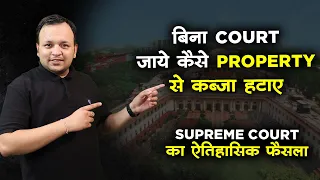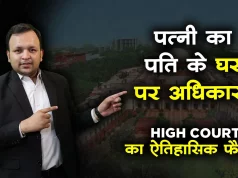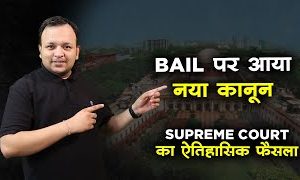Introduction
The term “adverse possession” in common parlance refers to a legal principle that grants title to someone who resides on or is in possession of another person’s land. The property’s title is granted to the possessor as long as certain conditions are met including whether they infringe on the rights of the actual owner and whether they are in continuous possession of the property. Adverse possession is sometimes called squatter’s rights, although squatter’s rights are a colloquial reference to the idea rather than a recorded law.
Several questions are raised by an owner of the property like if a person has purchased a property for investment and if someone takes possession of it, what will be the legal rights of the owner? Will the Court provide the remedy to a person who is the owner of the property for eg. a house on which some other person has claimed his right to adverse possession? How to get the occupied property vacated in one day? All the above questions are answered in the Landmark judgment of the Supreme Court in Poona Ram vs. Moti Ram (D) Th. Lrs. on 29.01.2019
Landmark Judgement in Poona Ram vs. Moti Ram (D) Th. Lrs. on 29.01.2019
Brief facts of the Case
Moti Ram had filed a suit over an immovable property over which he claimed the possessory title, which seemed merely based on his prior possession of the property for several years. However, Moti Ram had no documents to evidence his possession of the same. Poona Ram submitted his title deeds to the suit property, having thus claimed a better title to the suit property. The Trial Court decreed the suit in favour of Moti Ram, but the First Appellate Court reversed the order of the Trial Court and held that Poona Ram in lieu of title deeds had proved his title over the suit property in question. However, in the Second Appeal, the High Court of Rajasthan restored the order of the Trial Court and observed that Poona Ram was not able to prove his title over the property on two grounds:
- claim for a better title or disposition of Moti Ram’s title over the property,
- Moti Ram not being in possession of suit property, but Moti Ram had possessory title to suit property based on his long-term possession. It is based on this observation that Poona Ram approached the Apex Court.
Final Judgement
The Hon’ble Supreme Court in the judgment observed that a person who asserts possessory title over a particular property will have to show he is under settled or established possession of the said property. Therefore, the Supreme Court, in the present case in light of the above submission had to observe whether Moti Ram had better title over the suit property and whether he was in settled possession of the property, which required dispossession as per law.
The Hon’ble Court, while addressing the stance under Section 64 of the Limitation Act, wherein a suit for possession of immoveable property based on previous possession and not on title, if brought within 12 years from the date of dispossession, opined that such a suit is based on possessory title as opposed to proprietary possession has also elaborated on the term “settled possession” holding that such possession over the property which has existed for a long period and such effective possession of a person without a title would entitle him to protect his possession, similar to that of a true owner.
The Hon’ble Supreme Court discussed the above issue by relying upon the following landmark judgments:
In Nair Service Society Ltd vs. K.C Alexander, AIR 1968 SC 1165, wherein the Court held that a person in possession of land in the assumed character of the owner and exercising peaceably the ordinary rights of ownership has a perfectly good title against the entire world except for the rightful owner. In such a case, the defendant must show in himself, or his predecessor a valid legal title and probable possession before the plaintiff’s possession, and thus be able to raise a presumption prior in time.
The crux of the matter is that a person who asserts possessory title over a particular property will have to show that he is under settled or established possession of the said property. But merely stray or intermittent acts of trespass do not give such a right against the true owner. Settled possession means such possession over the property which has existed for a sufficiently long period, and has been acquiesced to by the true owner. A casual act of possession does not have the effect of interrupting the possession of the rightful owner. A stray act of trespass, or a possession that has not matured into settled possession, can be obstructed or removed by the true owner even by using necessary force. Settled possession must be effective, undisturbed, and to the knowledge of the owner or without any attempt at concealment by the trespasser. There cannot be a straitjacket formula to determine settled possession. Occupation of a property by a person as an agent or a servant acting at the instance of the owner will not amount to actual legal possession. The possession should contain an element of animus possidendi. The nature of possession of the trespasser is to be decided based on the facts and circumstances of the case
The Supreme Court has also observed in this matter that Moti Ram as rightly observed by the First Appellate Court has not been able to prove with any documentary evidence that he was in actual possession of the suit property much less continuous possession. Actual Possession is “having physical control of any object or real property”. Therefore, it is clear that for the establishment of possessory title over the property, it is fundamental to establish the act of actual possession over the suit property, and thereafter the plea of continuous possession can be claimed to further the cause of the possessory title.
The Supreme Court rightly overruled the judgment of the High Court of Rajasthan for the fact that the Defendant had not made a strong case of possession merely based on the right of casual possession as no documentary evidence was advanced to prove that he may have been in actual and continuous possession of the suit property. Further, the owner has a right to claim back the possession with the use of reasonable force.
Conclusion
Illegal adverse possessions are claimed by people only based on the fact that they are in possession of the property of others for so many years and they take advantage of the same to infringe the rights of the original owner. But the Hon’ble Supreme Court mentioned that if a person has legal documents of ownership or has filed any complaint or issued a notice against the illegal possessor of the owned property or any person who is claiming adverse possession but is not in continuous possession of the property then a rightful owner who has been wrongfully dispossessed of land may retake possession if he can do so peacefully and without the use of unreasonable force.
If doubts still persist, contact our Legal Experts at












